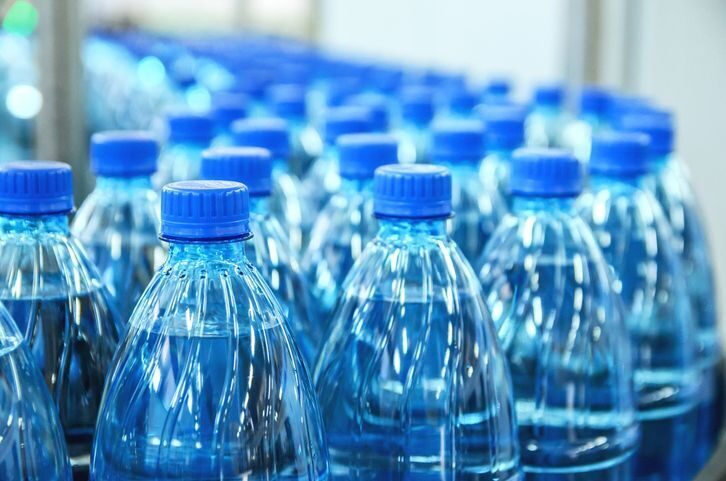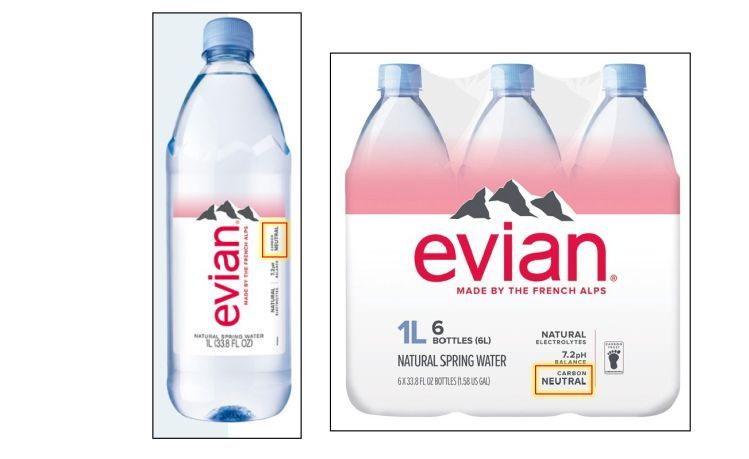A lawsuit challenging ‘carbon neutral’ claims on bottles of evian spring water “defies science and common sense” and should be thrown out of court, argues brand owner Danone Waters of America.
Regulatory affairs experts are closely watching the proposed class action lawsuit* — filed in New York in October 2022 — amid growing scrutiny of ‘green’ claims. In this case, the claim at issue was certified by a high-profile third party: The Carbon Trust.
Plaintiff: Danone’s advertising is ‘false and misleading under the FTC’s guidelines’
According to the complaint, evian bottled water, which was certified carbon neutral by the Carbon Trust globally in 2020, “is not ‘carbon neutral’ based on how a reasonable consumer would understand the term.”
Reasonable consumers — argue the plaintiffs — “would understand and believe that the term ‘carbon neutral’ means the manufacturing of the product — from materials used, to production, to transportation — is sustainable and does not leave a carbon footprint.”
Even if ‘carbon neutral’ means Danone has purchased credits to offset evian’s greenhouse gas emissions, the claim “is still false and misleading under FTC’s guidelines” because “any offsets will not happen for decades,” they claim.
This is because the FTC Green Guides require marketers to “disclose if offset purchases fund emission reductions that will not occur for two years or longer.”
“The organizations the defendant works with that are the basis for its carbon credits do not currently or actually reduce CO2 emissions, and thus do not offset the CO2 emissions created by the defendant’s production of the product in any manner,” adds the complaint. “Accordingly, even under the ‘carbon offset’ definition of ‘carbon neutral,’ [Danone’s] claim is still false.”
Danone Waters: Plaintiff is ‘manifestly unreasonable’
According to Danone Waters America, however, this “subjective interpretation” of its carbon neutral claim is “manifestly unreasonable.”
In a memo accompanying a motion to dismiss the case filed in late April, attorneys for Danone noted that the carbon neutral certification is underpinned by the Publicly Available Standard 2060 (‘PAS 2060’) published by the British Standards Institution. It adds: “There is no allegation that evian water has not, in fact, met that standard; it has.”
No reasonable consumer “would interpret carbon neutral to mean that the product does not emit any carbon dioxide whatsoever during its entire life cycle,” adds Danone. “One wonders how the plaintiffs think the product magically arrived from the French Alps to their homes without the emission of even a molecule of carbon dioxide.”
While the lead plaintiff may take issue with the concept of carbon offsets, adds Danone, her “musings on the efficacy of carbon offsets does not render the product’s true statements actionable.”
In any event, adds Danone, evian’s packaging comports with the FTC Green Guides: “The [‘carbon neutral’] claim communicates a specific environmental benefit—carbon neutrality—and is supported by third-party certification to the only internationally recognized standard for carbon neutrality.”
According to evian’s website, its bottling plant in Evian-les-Bains, France, runs on 100% renewable energy generated from hydropower and biogas: “We continuously measure and reduce our carbon emissions at each stage of our bottle’s life cycle: from the materials we use, to production, transportation and recycling. The emissions that remain are then offset through our work with Livelihood Funds that has planted 130 million trees. Mangrove trees trap CO2 and generate positive emissions, absorbing carbon and producing oxygen.”
Should bottled water make environmental claims at all?
David Kwasniewski, a partner at law firm BraunHagey & Borden, told food trade publication FoodNavigator-USA in a recent interview that lawsuits alleging greenwashing were on the rise, and that carbon neutral claims—while in this case underpinned by a specific third-party standard—were still risky.
“Judges and lawyers can construct all manner of arguments about what is and is not carbon neutral, and what would be reasonable in the eyes of any consumer seeing that phrase. Unless and until there is an actual regulatory definition, there is always going to be some risk with making a carbon neutral claim.”
You could also argue that any company packaging and shipping water in bottles (whatever they’re made out of) when consumers can simply turn on the faucet and drink municipal water instead, probably shouldn’t win any prizes for saving the planet, even if their claims are accurate, he said.
“There is a risk of a green halo claim arising from specific and even indisputably true language that nonetheless, plaintiffs’ lawyers or regulators will argue, makes a fundamentally unsustainable product like perhaps water sold in a plastic bottle appear more ecologically friendly than it actually is.”
*The case is Stephanie Dorris et al vs Danone Waters Of America. Case 7:22-cv-08717






